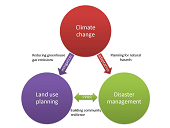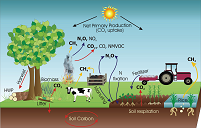
Ebook
Renewing Local Planning to Face Climate Change in the Tropics
Contents
Climate services in the Tropics -- Climate planning in medium-size cities of the Tropics -- Setting up and managing automatic weather stations for remote sites monitoring: from Niger to Nepal -- Characterization of climate risks for rice crop in Casamance -- Climate change, drought and food security: a methodology for the vulnerability analysis. The case of the West Arsi Woreda in Ethiopia -- Visualize and communicate extreme weather risk to improve urban resilience -- Climate change adaptation and resilience in Mali -- Building resilience to drought in the Sahel by early risk identification and advices -- Risk analysis and evaluation to improve climate adaptation planning in Western Niger -- A simplified hydrological method for flood risk assessment at sub-basin level in Niger -- Socio-technical transitions and resilient infrastructure: analyzing changes in access to water following infrastructure upgrade in Dar es Salaam, Tanzania -- Monitoring and evaluating advocacy and mainstreaming of climate change adaptation in Haiti -- Knowledge for transformational adaptation planning: comparing the potential of forecasting and back casting methods for assessing people vulnerability -- Possible impact of pelletized crop residues use as a fuel for cooking in Niger -- An effective Mainstreaming DRR and Resilience approach in La Paz (Mexico) and San Jose (Costa-Rica) -- Climate vulnerability reduction credits: measuring results of adaptation; potential applicability for sub-Saharan communities -- Review of pilot projects on index-based insurance in Africa: insights and lessons Learned -- A new perspective for integrating climate change in local development plans.
Abstract
This book is open access under a CC BY 4.0 license. This book aims to inspire decision makers and practitioners to change their approach to climate planning in the tropics through the application of modern technologies for characterizing local climate and tracking vulnerability and risk, and using decision-making tools. Drawing on 16 case studies conducted mainly in the Caribbean, Central America, Western and Eastern Africa, and South East Asia it is shown how successful integration of traditional and modern knowledge can enhance disaster risk reduction and adaptation to climate change in the tropics. The case studies encompass both rural and urban settings and cover different scales: rural communities, cities, and regions. In addition, the book looks to the future of planning by addressing topics of major importance, including residual risk integration in local development plans, damage insurance and the potential role of climate vulnerability reduction credits. In many regions of the tropics, climate planning is growing but has still very low quality. This book identifies the weaknesses and proposes effective solutions.
Availability
| edft56 C1 | edft56 | Main Library (WASCAL Head Office) | Available |
| edft56 C2 | edft56 | Main Library (WASCAL Head Office) | Available |
Detail Information
- Call Number
-
edft56
- Publisher
- Cham : Springer International Publishing., 2017
- Physical Description
-
XVI, 372 p. 91 illus.
- Language
-
French
- ISBN / ISSN
-
3319590960 9783319590967
- Edition
-
-
- Keyword(s)
Other version/related
No other version available
File Attachment
Comments
You must be logged in to post a comment
 Climate Change
Climate Change  Water Resources
Water Resources  Land Use
Land Use  Agriculture
Agriculture  Disaster Risks Management
Disaster Risks Management  Biodiversity
Biodiversity  Energy
Energy  Marine Science
Marine Science  Sustainable development
Sustainable development  Geography
Geography